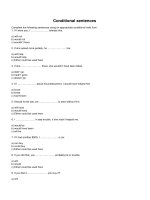Modals in conditional sentences
Bạn đang xem bản rút gọn của tài liệu. Xem và tải ngay bản đầy đủ của tài liệu tại đây (12.52 KB, 1 trang )
Modals in conditional sentences
In first conditional sentences, we use a
simple present tense
in the
if-clause
and
will + infinitive
in the main
clause. This is the standard form. Alternate forms with other auxiliaries are also possible. Note that first
conditional forms with modals express ideas such as permission, advice, future possibilities etc.
Read the sentences given below.
If you finish your homework, you
can watch
TV.
If you have a few hours to spare, you
may visit
the museum.
If I have time, I
might make
a cake.
If I arrive early, I
might take
a stroll around the park.
If you don’t feel well, you
should consult
a doctor.
If and Adjectives
In a formal style,
subject + be
is sometimes left out after
if
.
If in doubt
, ask for help. (= If you are in doubt, ask for help.)
If interested
, please let me know. (= If you are interested, please let me know.)
Provided (that), As long as
Many words and expressions can be used with a similar meaning to
if.
Common examples are: imagine (that),
suppose (that), supposing (that), providing (that), provided (that), as long as, on condition that etc.
The words
imagine, suppose
and
supposing
are used to talk about what might happen.
Supposing you lost your job, what would you do?
Imagine you won a jackpot!
Provided that, as long as
and
on condition that
are used to make conditions.
You may take two days off on condition that you work on the weekend.
You can stay with us as long as you share the expenses.
Be first to know when grammar rules change! Sign up to our newsletter here: englishgrammar.org (It's free)
Powered by TCPDF (www.tcpdf.org)









